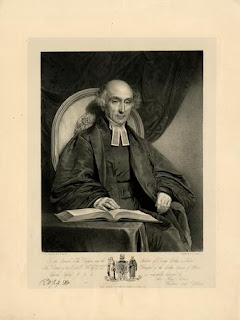"No sacrifice of the blessed Body of our Lord": Jelf's Bampton Lectures and the feast upon the Sacrifice
The caution he expresses at the outset regarding any offering of the consecrated elements reflects the mainstream Old High tradition, which distanced itself from John Johnson's Unbloody Sacrifice (1724) and the enthusiasm of some advanced Non-Jurors for that work. Instead, in typical Laudian and Old High fashion, Jelf refers to a commemorative - not propitiatory - sacrifice.
This also, of course, reaffirms the Protestant nature of the Old High tradition, firm in its rejection of Trent's teaching on the Sacrifice of the Mass. Indeed, we might quote Stephen Hampton's recent study of the Reformed Conformists in the Jacobean and Caroline Church: "Reformed orthodoxy had plenty of room for sacrificial language, so long as that sacrifice was understood in a representative and commemorative sense". (We should note that Hampton, entirely incorrectly, assumes that the Laudians were somehow promoting an understanding of Eucharistic sacrifice that was not clearly, explicitly representative and commemorative.)
Jelf, then, was providing an account of the Eucharistic sacrifice which would have been recognised and assented to by divines of the ecclesia Anglicana since the Reformation:
Whether the consecrated elements, as such, are offered up in the Holy Communion, in commemoration of the only Sacrifice upon the cross, is another question, which, as our Church, in her official acts, has left undecided, it appears unnecessary to discuss at length. Certainly there is nothing in her offices which is not fully consistent with the Eucharistic Sacrifice, as recognised by the early Fathers, and maintained by her own soundest divines. It has been well said, "that every oblation recognised by the Christian Church is contained in the English Liturgy. There are the offerings of prayer and alms, the sacrifice of praise and thanksgiving, the oblation of God's creatures of bread and wine, the reasonable, holy, and lively sacrifice of ourselves, our souls and bodies, unto God"." And in the whole of this, our reasonable and spiritual sacrifice, we do, no doubt, "shew the Lord's death till He come"; therefore our sacrifices are effectually commemorative; we are "fulfilled with God's grace and heavenly benediction", and therefore the benefits of the only sacrifice are perpetuated and secured to our enjoyment; yet there is no sacrifice of the blessed Body of our Lord, or continuation of the same sacrifice, or any sacrifice propitiatory in the proper sense of the term.
The quotation in the midst of this extract is from William Palmer's Origines Liturgica (1832), an influential liturgical study which defended the patristic credentials of the Book of Common Prayer. Palmer was also a Z and a critic of Newman. As Nockles notes, Tractarians regarded Palmer as "stuck in the mental groove of 1833" - which, considering the destructive effects of Tractarianism, is surely to be regarded as a compliment.
There is more than an echo in Jelf's words of the 'feast upon a sacrifice' understanding that was commonplace Old High teaching (see, for example, William Vaux's 1826 Bampton Lectures). Jelf makes this explicit when he goes on to contrast 'feast upon a sacrifice' with the Tridentine notion of propitiatory sacrifice:
Romanists have added to the notion of the Communion of the Body and Blood another tenet which is at variance with the Scriptural and Catholic doctrine of the one Sacrifice on the cross, viz. that, in the Lord's Supper, Christ is offered up as a sacrifice to God by the priest, whereas our Church teaches that the Body and Blood of Christ are communicated to the faithful receiver by means of the elements consecrated and delivered by the priest.
Once again, we see in this Z presentation of Old High thought an understanding of the holy Eucharist which could have sustained Anglican coherence post-1833, rather than the divisive controversies promoted by Tractarian Eucharistic teaching and practice gazing across the Tiber.




Comments
Post a Comment